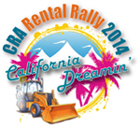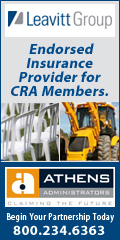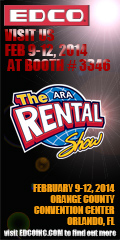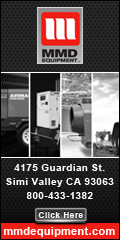
| December 2013 | Past Issues/Subscribe | Printer-Friendly | Advertise |
UPCOMING EVENTS
 January 13–15, 2014 CRA Rental Rally - Pomona, CA more.. January 15, 2014 CRA Board of Directors Meeting - Pomona, CA January 16–20, 2014 CRA RV Campout in the Desert - Quartzsite, AZ more... January 21–24, 2014 World of Concrete - Las Vegas, NV February 9–12, 2014 The Rental Show - Orlando, FL more...  March 4–8, 2014 CONEXPO-CONAGG - Las Vegas, NV more...
VENDOR NEWS
 CRA's 2014 Rental Rally Tradeshow is scheduled for January 14 and 15 in Southern California, at the Fairplex in Pomona. The tradeshow will include two days of equipment, party and services exhibits and an outdoor equipment display/demo area. Store tours, an opening cocktail party and a show banquet are also planned. Thank you to exhibitors who have recently signed up! Click on "Learn More" to see this list of exhibitors and more information about the show. CRA's 2014 Rental Rally Tradeshow is scheduled for January 14 and 15 in Southern California, at the Fairplex in Pomona. The tradeshow will include two days of equipment, party and services exhibits and an outdoor equipment display/demo area. Store tours, an opening cocktail party and a show banquet are also planned. Thank you to exhibitors who have recently signed up! Click on "Learn More" to see this list of exhibitors and more information about the show.
Learn More...  Atlas Copco Compressors honored employee contributions at the Oct. 10–12, 2013 NASCAR race weekend at Charlotte Motor Speedway in Concord, NC. To thank past and present employees during Atlas Copco’s year-long 140th anniversary celebration, employee Mark Kiser had his name, along with the Atlas Copco logo, printed on Ryan Newman’s No. 39 Quicken Loans Chevrolet Impala. Kiser also received garage credentials and suite tickets to the Sprint Cup Series race on Oct. 12, in which Newman finished in the top ten. Kiser also had the opportunity to meet Ryan Newman before the race. Atlas Copco Compressors honored employee contributions at the Oct. 10–12, 2013 NASCAR race weekend at Charlotte Motor Speedway in Concord, NC. To thank past and present employees during Atlas Copco’s year-long 140th anniversary celebration, employee Mark Kiser had his name, along with the Atlas Copco logo, printed on Ryan Newman’s No. 39 Quicken Loans Chevrolet Impala. Kiser also received garage credentials and suite tickets to the Sprint Cup Series race on Oct. 12, in which Newman finished in the top ten. Kiser also had the opportunity to meet Ryan Newman before the race.
Learn More...  Bobcat Company has released its first Tier 4 loaders — including a non-diesel particulate filter (DPF) engine solution. The seven medium-sized machines make up the most popular size class in the Bobcat® loader family and provide operators with all of the same performance benefits of the previous interim Tier 4 models. The Tier 4 Bobcat non-DPF solution was achieved by designing an ultra-low particulate combustion (ULPC) engine. The ULPC is accomplished through a specially designed engine combustion chamber that significantly reduces the amounts of particulate matter created during combustion. Therefore, Tier 4 emissions compliance can be achieved without using a DPF. Bobcat Company has released its first Tier 4 loaders — including a non-diesel particulate filter (DPF) engine solution. The seven medium-sized machines make up the most popular size class in the Bobcat® loader family and provide operators with all of the same performance benefits of the previous interim Tier 4 models. The Tier 4 Bobcat non-DPF solution was achieved by designing an ultra-low particulate combustion (ULPC) engine. The ULPC is accomplished through a specially designed engine combustion chamber that significantly reduces the amounts of particulate matter created during combustion. Therefore, Tier 4 emissions compliance can be achieved without using a DPF.
Learn More...  The Association of Washington Business (AWB) recently recognized Terex Aerial Work Platforms’ Genie brand with its Manufacturing Excellence Award for innovation. The annual awards acknowledge unparalleled Washington manufacturers for innovation and operational excellence. Selected from hundreds of Washington businesses, Genie received the award due to its "significant progress in designing, developing and delivering a blockbuster product concept," the AWB stated in a press release announcing this year’s award winners. "This honoree has maintained a competitive advantage by sustaining considerable innovation while remaining responsive to market demands. The products made at its facilities are unique and innovative." The Association of Washington Business (AWB) recently recognized Terex Aerial Work Platforms’ Genie brand with its Manufacturing Excellence Award for innovation. The annual awards acknowledge unparalleled Washington manufacturers for innovation and operational excellence. Selected from hundreds of Washington businesses, Genie received the award due to its "significant progress in designing, developing and delivering a blockbuster product concept," the AWB stated in a press release announcing this year’s award winners. "This honoree has maintained a competitive advantage by sustaining considerable innovation while remaining responsive to market demands. The products made at its facilities are unique and innovative."
Learn More...  Environmental sustainability takes many forms at Kohler Co. – from designing more water-efficient plumbing products to restoring iconic buildings, and from polypropylene resin engine covers made from recycled carpet to associates completing hundreds of projects in-house to reduce the company’s environmental footprint. Sustainability is a journey that many of Kohler’s 30,000 global associates have embraced, and they are taking action to positively affect the world around them. As an appropriate next evolution, Kohler has created a story-sharing platform to highlight the successes around sustainability achieved by its associates, channel partners and consumers. Their stories are now being told on a new blog called Believing In Better™. Environmental sustainability takes many forms at Kohler Co. – from designing more water-efficient plumbing products to restoring iconic buildings, and from polypropylene resin engine covers made from recycled carpet to associates completing hundreds of projects in-house to reduce the company’s environmental footprint. Sustainability is a journey that many of Kohler’s 30,000 global associates have embraced, and they are taking action to positively affect the world around them. As an appropriate next evolution, Kohler has created a story-sharing platform to highlight the successes around sustainability achieved by its associates, channel partners and consumers. Their stories are now being told on a new blog called Believing In Better™.
Learn More...  Vermeer congratulates Dwell Earth LLC for recognition of the Block Press in Popular Science magazine’s December 2013 issue. Popular Science named the BP714 Block Press to the Best of What’s New innovations of 2013. Dwell Earth’s Block Press, which converts dirt into blocks used for building construction, merges innovative technologies with building solutions that impact lives around the world. "For more than a quarter century, Popular Science has devoted its December issue to the year's most remarkable innovations. The Best of What's New Awards is our magazine's top honor, and the 100 awardees are selected from a pool of thousands," said Cliff Ransom, Executive Editor of Popular Science. "Each winner is handpicked and revolutionary in its own way. Whether they're poised to change the world or simply your living room, the Best of What's New awardees challenge us to the see the future in a new light." Vermeer congratulates Dwell Earth LLC for recognition of the Block Press in Popular Science magazine’s December 2013 issue. Popular Science named the BP714 Block Press to the Best of What’s New innovations of 2013. Dwell Earth’s Block Press, which converts dirt into blocks used for building construction, merges innovative technologies with building solutions that impact lives around the world. "For more than a quarter century, Popular Science has devoted its December issue to the year's most remarkable innovations. The Best of What's New Awards is our magazine's top honor, and the 100 awardees are selected from a pool of thousands," said Cliff Ransom, Executive Editor of Popular Science. "Each winner is handpicked and revolutionary in its own way. Whether they're poised to change the world or simply your living room, the Best of What's New awardees challenge us to the see the future in a new light."
Learn More...  For rental stores across the US, doing business with The Toro Company is now just a click away with the launch of www.tororental.com. ToroRental.com is a new online store for authorized rental customers and contractor supply companies to buy Toro equipment and parts online. The site offers customers a secure way to browse products and parts' drawings, view pricing and availability and check order status and history. All products and parts available to Toro rental customers can be purchased on the site. For rental stores across the US, doing business with The Toro Company is now just a click away with the launch of www.tororental.com. ToroRental.com is a new online store for authorized rental customers and contractor supply companies to buy Toro equipment and parts online. The site offers customers a secure way to browse products and parts' drawings, view pricing and availability and check order status and history. All products and parts available to Toro rental customers can be purchased on the site.
Learn More...  As part of efforts to focus on its core business, the Volvo Group has agreed to sell Volvo Rents to the US private equity firm Platinum Equity for $1.1 billion. Volvo Construction Equipment will continue to sell products to Volvo Rents under the new ownership. Volvo Rents offers rental of a range of machines intended for the construction and engineering industry, including Volvo Construction Equipment (Volvo CE) products. Volvo Rents has operations in the US, Canada and Puerto Rico and 2,100 employees. In the first nine months of 2013 Volvo Rents had net sales of SEK 3.1 billion. Platinum Equity is a California-based investment firm with experience in investing in the equipment rental market. As part of efforts to focus on its core business, the Volvo Group has agreed to sell Volvo Rents to the US private equity firm Platinum Equity for $1.1 billion. Volvo Construction Equipment will continue to sell products to Volvo Rents under the new ownership. Volvo Rents offers rental of a range of machines intended for the construction and engineering industry, including Volvo Construction Equipment (Volvo CE) products. Volvo Rents has operations in the US, Canada and Puerto Rico and 2,100 employees. In the first nine months of 2013 Volvo Rents had net sales of SEK 3.1 billion. Platinum Equity is a California-based investment firm with experience in investing in the equipment rental market.
Learn More... BUSINESS NEWS
The December 6th CalChamber Alert Newsletter reported that Covered California, the state’s marketplace for the federal health care reform law, has launched the full self-enrollment function of the Small Business Health Options (SHOP) online marketplace. This significant new function on the Covered California website will enable small business owners with one to 50 eligible employees to fully enroll for coverage now that may begin as early as January 1, 2014. Online enrollment for small businesses in 36 other states relying on the federal exchange has been delayed for a year by federal officials while they work on making the federal health care insurance website workable for individuals seeking to shop for insurance.
Learn More... Joe Mathews (Connecting California Columnist and Editor, Zócalo Public Square, Fellow at the Center for Social Cohesion at Arizona State University and co-author of California Crackup: How Reform Broke the Golden State and How We Can Fix It [UC Press, 2010]) commented on Obamacare on foxandhoundsdaily on December 12th. Here's his take on Obamacare: "The Affordable Care Act created a lot of new health insurance marketplaces, and the secret is that they’re not really federal or state entities. They’re regional. For the purposes of selling insurance to individuals and small groups, California’s government divided the state into 19 regions, each with different insurance prices and subsidies based on demographic and economic data. If you’ve heard about the 'state insurance exchange' in the media, it doesn’t refer to one market. In California, it refers to 19 different regional markets. Obamacare’s impact will differ across Californian communities, often in unpredictable ways. Unless you’re a policy buff, you’re probably best off if you stick to understanding your own market."
Learn More... The Associated General Contractors of America reported earlier this month that the unemployment rate for workers actively looking for jobs and last employed in construction declined from 12.2% in November 2012 to 8.6% last month. Construction employers added 17,000 jobs in November as the sector’s employment hit the highest level since August 2009. The construction-industry unemployment rate fell to 8.6 percent, according to an analysis of new government data by the Associated General Contractors of America. Association officials noted that the new employment figures come as construction spending levels hit a four-year high in October.
Learn More... The U.S. Energy Information Administration (EIA) reports that while West Texas Intermediate (WTI) crude oil has traded at a persistent discount to Dated Brent crude since late 2010, the near-parity between Light Louisiana Sweet (LLS) crude and Dated Brent has only recently changed. In July, as U.S. refiners processed near-record amounts of crude oil, the discount of WTI relative to Brent narrowed to an average of $3.26 for the month, the lowest since December 2010.
As the Brent-WTI spread began to widen again in September, the LLS price, which historically had closely tracked Brent, moved lower with WTI. From January through August, LLS prices averaged $1.45 per barrel more than Brent, but since the start of September, LLS prices averaged $7.14 less than Brent. The opening of a large LLS discount to Brent and the increasing convergence of LLS and WTI prices result from pipeline expansions and reversals that have reduced bottlenecks in the U.S. mid-continent, continuing growth in domestic light oil production, and a seasonal decline in crude oil runs at U.S. Gulf Coast refineries during October. Learn More... CARB
All diesel-fueled trucks, buses, trailers and transportation refrigeration units operating in California, including those based out of state, have requirements to reduce air pollution and improve the state's overall air quality. Avoid penalties due to manufacturer delay — order soot filters by September 1, 2013 to meet January 1, 2014 requirements for the Truck & Bus Regulation. Only purchase CARB-verified filters. Check before you buy! See the DPF handbook: A Truck Driver’s Guide to Care and Maintenance of Diesel Particulate Filters.
Learn More... The ARB's Heavy-Duty Vehicle Inspection Program and Periodic Smoke Inspection Program were adopted into law in 1988 to control excessive smoke emissions and tampering from heavy-duty diesel trucks and buses. The regulations Title 13 CCR, sections 2180-2189 for HDVIP and Title 13 CCR, sections 2190-2194 for PSIP, which govern these programs, were last amended in 2013.
The HDVIP program requires heavy-duty trucks and buses to be inspected for excessive smoke and tampering and for engine certification label compliance. Any heavy-duty vehicle traveling in California, including vehicles registered in other states and foreign countries, may be tested. Tests are performed by ARB inspection teams at border crossings, CHP weigh stations, fleet facilities and randomly selected roadside locations. Owners of trucks and buses found in violation are subject to minimum penalties starting at $300 per violation. Learn More... Owners or Operators of portable engines and certain other types of equipment can register their units under the Air Resources Board's (ARB) Statewide Portable Equipment Registration Program (PERP) in order to operate their equipment throughout California without having to obtain individual permits from local air districts. The following sections will assist you with the PERP registration process and present facts on the Portable Diesel Engine Airborne Toxic Control Measure (ATCM).
As of January 1, 2013, the Portable Engine Airborne Toxic Control Measure (ATCM) fleet standards are in effect. The ATCM requires owners of portable engines to submit a statement of compliance signed by a Responsible Official to the Air Resources Board by March 1, 2013. In addition to the statement of compliance, a summary that identifies each portable engine in the fleet and the associated emission rate (g/bhp-hr) must be included. Considering Making Changes to Your Fleet? The ATCM also requires owners to ensure that the average PM emission level for their fleet does not fall out of compliance due to changes in the composition of the fleet. Buying, selling, or modifying engines could result in a fleet becoming noncompliant. PERP registrants considering adding, removing and/or modifying engines in their fleet are strongly encouraged to re-calculate their fleet average to ensure that the fleet is still compliant with the applicable standard before submitting requests to ARB. Learn More... The small off-road engine (SORE) category consists of off-road spark-ignition engines below 25 horsepower, including small utility equipment, lawn mowers and weed trimmers. This category does not include compression-ignition engines, watercraft or recreational vehicles. ARB has a page on its website that includes general information regarding small off-road engines and ARB's SORE program. Click on "Learn More" to access this page.
Learn More... The regulation requires diesel trucks and buses that operate in California to be upgraded to reduce emissions. Heavier trucks must be retrofitted with particulate matter (PM) filters beginning January 1, 2012, and older trucks must be replaced starting January 1, 2015. By January 1, 2023, nearly all trucks and buses will need to have 2010 model year engines or equivalent.
What's New? Advisory on Extension of Particulate Matter Filter Requirement for Certain Types of Cranes (July 10, 2013) Mail-Out 13-17 provides a PM filter compliance extension for certain types of cranes until January 1, 2018 and explains how compliance is determined when using the extension. Learn More... This area of the Off-Road Mobile Sources website pertains to off-road large spark-ignition (LSI) equipment greater than 25 horsepower, including farm, construction, and industrial equipment, powered by gasoline and liquefied petroleum gas (LPG) and other alternate fuels. Typical applications that use LSI engines include forklifts, specialty vehicles, airport service vehicles, large turf care equipment, portable generators, and a wide array of other agricultural, construction, and general industrial equipment. The U.S. EPA has sole authority to control new farm and construction equipment under 175 horsepower.
Learn More... On July 26, 2007, the Air Resources Board (ARB) adopted a regulation to reduce diesel particulate matter (PM) and oxides of nitrogen (NOx) emissions from in-use (existing) off-road heavy-duty diesel vehicles in California. For more information, please call the diesel vehicle information hotline at (866) 6-DIESEL or (866) 634-3735.
Posted April 23, 2013: The revised Fleet Average Calculator for large fleets is now available. The calculator is for the large fleet January 1, 2014 compliance date only. The Fleet Average Calculator is an Excel spreadsheet designed to assist fleet owners in calculating their Fleet Average Index and Fleet Average Targets, based on the equipment model year and horsepower input. The calculator allows fleets to experiment with different turnover, repower and retrofit strategies to plan for compliance with the in-use off-road diesel vehicle regulation. Learn More... The Truck and Bus Regulation will reduce diesel exhaust emissions from privately owned and federal government diesel trucks and buses. Privately and publicly owned school buses have different requirements and do not need to be reported. This CARB site has the Truck Regulations Upload and Compliance Reporting System (TRUCRS) and was last reviewed July 25, 2013.
Learn More... In December 2011 major amendments to the Off-Road Diesel Vehicle Regulation, which include delaying the first compliance date to no earlier than January 1, 2014, became effective. The changes to the regulation are reflected in the fact sheets, advisories and answers to frequently asked questions available on the Knowledge Center for the Off-Road Diesel Vehicle Regulation Web page.
Learn More...  Driving Toward a Cleaner California (DTCC) is a coalition of owner-operators, farmers, construction contractors and other business and community leaders committed to working with the California Air Resources Board (CARB) to craft a sensible truck and bus replacement rule that both cleans the air and keeps California's economy moving forward. Driving Toward a Cleaner California (DTCC) is a coalition of owner-operators, farmers, construction contractors and other business and community leaders committed to working with the California Air Resources Board (CARB) to craft a sensible truck and bus replacement rule that both cleans the air and keeps California's economy moving forward.
Learn More... |

| calrental.org |



